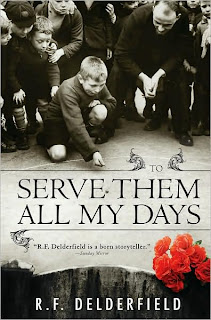Alexander McCall Smith is the author who has given us Precious Ramotswe, the woman who establishes herself as a private detective in Botswana by starting her own private detective agency, and whose exploits and relationships are shared in regular installments of the series The Number 1 Ladies Detective Agency. The pleasure of reading these books lies less in the mysteries she solves and more in the world she inhabits. Smith is masterful at conveying settings, giving us the feel of the day, the colors and smells of the city or bush, the details of the homes and offices where action takes place, the need for, and refreshment of, a cup of "bush tea" at just the right time. He also creates vibrant characters whom we come to know, and like. How they think, what they say, and especially, how they feel about things is written so well that they soon become friends and companions. We want to spend time with them.

In a recent stand-alone novel, Smith turns his attention to a very different time and place. The story takes place in war-time England and is not exactly a mystery. The plot and action are adequately entertaining but succeed especially at serving as a platform on which the author can construct and animate characters that exhibit the same wonderful traits traits that we have come to expect from his Number 1 Ladies series: good-heartedness, endearing flaws and frailties, uncertainty, determination, and ultimately, the warmth and kindness that reflect the best of humanity.
La (short for Lavender) Stone, Cambridge University graduate, finds herself widowed at a young age as the Second World War begins. As the Blitz (bombing of London by the Germans) begins, she moves from London to a remote village in Sussex to fix up a cottage, tend a garden and sort things out. Because of the presence of troops and airmen nearby, she starts an amateur orchestra to give everyone enduring this limbo something to do and some reason to congregate.
The presence in the village of a wounded Polish airman no longer able to fly with the Polish forces in the Battle of Britain provides the emotional ingredients and enough mystery to move the plot along. His work helping with pig farmers reinforces the earthiness of this story.
That's it. Not a mystery. A short book, perhaps a novella. A familiar setting. A cozy world, threatened by the terror that is war. A sympathetic main character whose very ordinary life is being lived out in a world that is out of control. Amusing and entertaining support characters who help make a good story.
Some books are meant to provide full and comprehensive reading experiences. They can dazzle us, or consume us. We rise to the expectations set by the author and share in a challenging reading experience.
Reading others, and La's Orchestra is one of them, is more like indulging in a really delicious pastry. A baked good focuses your satisfaction on a few simple combinations of the best ingredients, combined and cooked in a way that can create something so intense, sweet, and gratifying that eating more than one at a time seems pointless. Crust and filling, sweet and spice, crisp and cream come together. Reading La's Orchestra is like consuming such a pastry. One cannot survive on a diet of pastry. We can reach our limit quickly. We will always seek out the full and satisfying meal. Still, the world is a better place because pastries are on the menu, and the day is a better day when one can indulge in such a treat.
La's Orchestra is that kind of treat. I found myself slowing down as I read, absorbing the details of the narrative. La's initial entry into her rural cottage, and her encounter with the wild and overgrown garden that she will shape and nurture, is in itself a masterpiece of descriptive writing. It is not overly dramatic. The house and garden are ordinary, even plain. Smith allows you to understand this and then, through La's thoughts and feelings, shows us the potential she sees in both cottage and garden. We, as La is, are consoled and invigorated with hope and life.
I gave this book to a friend in the hospital. I was looking for something beautiful and delicate, nothing too challenging but, for this reader especially, substantial enough to satisfy and transport. I wasn't thinking of this book as I roamed the bookstore but as soon as I saw it, I realized at once that bringing this book would be like bringing a box of chocolates, just right for the occasion.
If you are in need of such a treat, consider La's Orchestra Saves the World. Then, if you haven't yet met Precious Ramotswe, introduce yourself to The Number 1 Ladies Detective Agency. You will come back for more.



